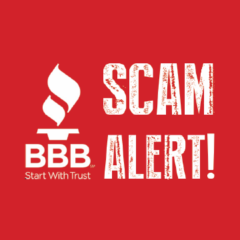
By the BBB Southern Piedmont
When shopping or donating, watch out for schemes trying to steal your cash or your personal information. Always be cautious with social media ads promoting discounted items, events, and donation requests. If you are asked to make a payment or donation by wire transfer, through a third party, or by prepaid debit or gift card, treat it as a red flag.
- Misleading social media ads – Always research before you buy. BBB Scam Tracker receives daily reports of people paying for items that they never receive, getting charged for a free trial they never signed up for, or receiving an item that is counterfeit or different from the one advertised.
- Social media gift exchanges – Each year this scheme pops back up. The old version was called “Secret Sister.” Newer versions of this scam include exchanging bottles of alcohol, purchasing $10 gifts online, submitting your email to a list where participants get to pick a name and send money to strangers to “pay it forward” or “Secret Santa Dog” where you buy a $10 gift for your “secret dog”. In all these, participants share their personal information and are tricked into buying and shipping gifts or money to unknown individuals.
- Holiday apps – Apple App Store and Google Play list dozens of holiday-themed apps where children can video chat live with Santa, light the menorah, track Santa’s sleigh on Christmas Eve, etc. Review privacy policies to see what information will be collected. Free apps can also contain malware.
- Fake toll collection texts – If you’re planning to drive a long distance to visit family, watch out for fake road toll collection texts. Scammers text you saying you owe a toll and provide a link to click to make your payment. If you receive a text, don’t click the link. Instead, if you think you may owe tolls, verify your outstanding balance with the legitimate agency.
- Free gift cards – Everyone loves the word “FREE”. Scammers send bulk phishing emails requesting personal information to receive free gift cards. In some of these emails, scammers impersonate legitimate companies and promise gift cards to reward their loyal customers. They may also send text messages with links saying you were randomly selected as the winner of a prize.
- Temporary jobs – Employment scams were identified as the number one riskiest scam for people ages 18-44 in 2023. If you’re looking for work, keep an eye out for opportunities that seem too good to be true. Job seekers need to be wary of employment scams aimed at stealing money and personal information from job applicants.
- Impostor scams – When shopping online, be on the lookout for fake, look-alike websites created by scammers to trick people into downloading malware, making dead-end purchases, and sharing confidential information. For Customer Service, always go to the business’s website and find their official social media handles or use the information on the site to reach out.
- Fake charities – Donors are advised to look out for fraudulent charities and scammers pretending to be individuals in need. Avoid impromptu donation decisions to unfamiliar organizations.
- Fake shipping notifications – Consumers making online purchases brings notifications about shipping details from retailers and carriers. Scammers use this to send phishing emails and texts about package deliveries with links enclosed that may allow access to your private information, download malware or trick people into paying new shipping fees. Never click a link in a text or email that you are not expecting. If you want to track a package, find the original email, or text confirmation you received directly from the store and use that link.
- Puppy scams – Many families may be looking for a furry friend. However, be on the lookout for frauds. Many would-be pet owners turn to the internet to find their future cat or dog, but experts say a shocking 80% of sponsored pet advertisements are fake. Be sure to see the pet in person before making a purchase.
We hope you never do, but should you become the target of a scam, please visit BBB.org/ScamTracker. You can also email questions or concerns to info@charlotte.bbb.org or call them at 704-927-8611. The Better Business Bureau offers many resources for older adults, which can be found on their website at BBB.org/olderadults.



